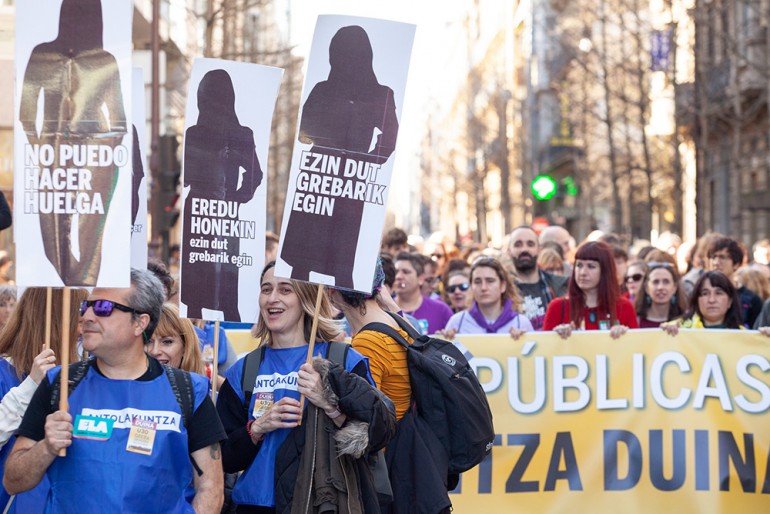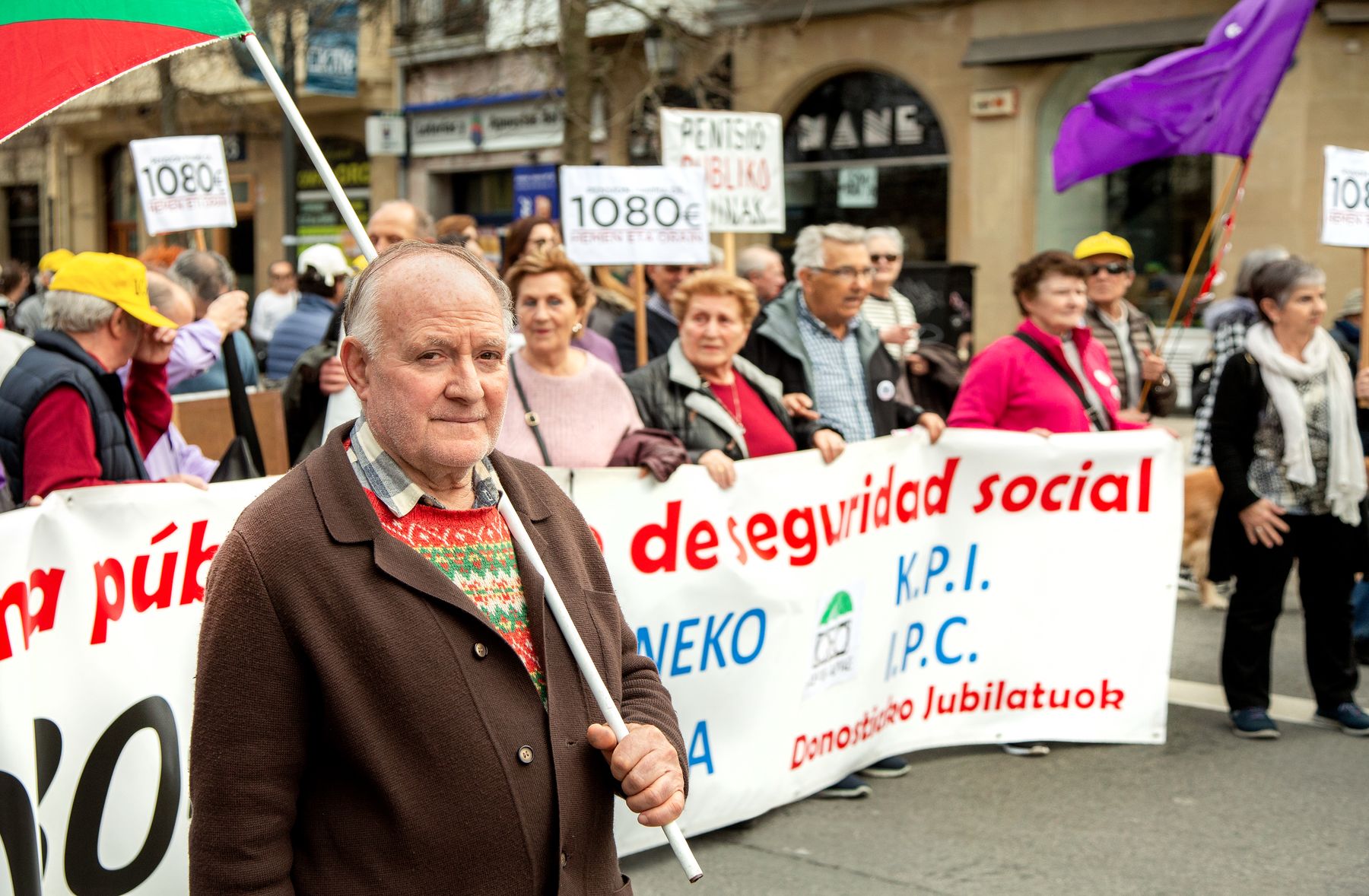General strike, the road to transformation
- After the massive and hopeful mobilizations of the strike, the time for reflection, with the challenges facing the future, is both necessary and healthy.

Starting point: “This general strike sets out a differentiated course of action: on the one hand, a trade unionism that counteracts with the necessary capacity for transformation in the current contexts and, on the other hand, another syndicalism of concertation and social dialogue subject to systemic policy. The difference between an economic policy of labor and the economic policy of capital” (Towards the general strike: Luis Rodríguez Algams, Jon las Heras). Two positions, two strategies and their consequences in sight.
Because it is not a question of making a social dialogue between capital and labor at certain times, or of establishing a tactical consensus or consensus between the transformative left and the centre left, although the progress is very modest. The question is how and for what purpose they are done. This principle serves both social struggles and national conflict. The pathways of unilaterality or consensus are not in themselves correct or incorrect, but in what situations, conditions and objectives they are carried out: on the path of integration into the system or of the democratic breakdown to breathe.
In our view, the views against the General Strike have been very miserable and unjustifiable. Knowing the slavery of CCOO and UGT with the Spanish government, it has not surprised us, but it has distressed us. But Podemos's, surprised and distressed at the same time, fighting everything they have predicted so far. In fact, in the methodology of the transformative left it has always been considered that, when something favorable is achieved through the pacts, for the pact to materialize, it is important to promote popular mobilizations. How can we achieve something transformative by weakening the momentum of citizenship? That's throwing stones into our roof. The employers and the bourgeoisie are always putting pressure on governments, which easily comply with these pressures, provided that citizens do not put pressure on them. Are there other ways of facing the right and the bourgeoisie? Of course, if we want to go beyond the current issue on the road to political and economic sovereignty.
EH Bildu has unfortunately been the only institutional group that has joined the general strike (other groups, but without institutional responsibilities). In our view, it has been right in its entirety, and from the point of view of plenary we are proud of that attitude, and we believe that it should promote the same strategy in all other areas, especially in that of national liberation. On many occasions, it is a concern of EH Bildu, at the institutional level, in the face of the risk of being alone (and with the latest decisions of Podemos that sense of loneliness has increased and has increased), to try to expand and strengthen alliances (the Llotja del Mar pact is important in this respect). Karmelo Landa asks in Argia “we have called a general strike loaded with motivation and reason. In addition to grass-roots movements, unions throughout the nation join in the ongoing mobilization, strike and passionate struggle, convinced that profound changes are needed in the conviction that parliamentarianism and conventional political dialogues are not enough to achieve them. The question is: Is there any political force in our country right now that matches these lines? Are not all the political forces here today sucked into the dubious hope of possible progressive governments and of parliamentary or “discreet” negotiations with them?”
Yes, we believe that the best remedy to overcome this feeling of loneliness, of uncertain hope, is the realization of a strong and effective counterbalance. In this sense, this general strike allows a fruitful and appropriate path to the emancipation plan.
Looking forward. For a long time, those of us who have been engaged in strike commissions and extensive mobilisation spaces have seen how effective and transversal the organisation of the strike has been (with revolutionary censuses, not confused with that sterile fashion interclassism): trade union activists, precarious young people, students and retirees; social activists of all kinds, feminists, citizens engaged in strike, and complacency: Wonderful experience. The Social Charter, which has fallen asleep in recent years, has now become the pillar of popular action; in the elaboration and consolidation of the popular programme, in the strengthening of punctual demands and in the implementation of a strategy that makes sovereignty in the face of futuro.En that sense, the fact that, in view of the problems in the world (xenophobic increase of the extreme right, dangerous climate change, austerity,
In short, from now on it should be a challenge, in the institutional and country political sphere, that political groups such as EH Bildu (oxala, which is also oriented in that direction) and that converge in the Social Charter, plus feminism, each from their independence, build a counter-hegemonic social block; also building a general counter-government to the Spanish State, the hegemony. When the PNV denounces that EH Bildu is an accomplice of ELA-LAB, our answer must be yes. And proud, moreover, of the alliance from our independence, not as its dependence on the bosses.
Euskal Herria is lagging behind in some respects in relation to Catalonia. We do not have institutions such as the ANC, Omniun, which on many occasions (on 1 October, for example) have been able to encourage sovereign parties (and the institutions that govern) to go further than the future quisieran.En. But in Euskal Herria we have something that, unfortunately, they do not have in Catalonia: an effective block of social sovereignty, which can conjugate the national, social, feminism, environmentalism, etc., which can be the meeting point of all the people who live and work in our people (who come from here). That is, what can push national construction on the left.
From the innovative experience of recent weeks and the strike of yesterday, perhaps, even though we are conditioned (although the avatars of our militant life advise us to be reasonable), we are convinced of that vindicated red spring, which we have regained the point of optimism. Unlike those who say that in the face of the grim situation there is nothing to do, we believe that everything is to be done. And yesterday's is a big step forward in building that task.
Hego Euskal Herrian arrazoi soziolaboralak edo politikoak direla medio, greba orokor bat deitzeak bere jarduera guztia geldiaraztea bilatzen du. Batzuentzat urtarrilaren 30eko greba orokorra arrakastatsua izan da, eta beste batzuentzat porrota, bakoitzaren betaurrekoen arabera.
Urtarrilaren 30eko Greba Orokorraren biharamunean, grebak suposatu duenaren inguruan hausnartzeko tartea hartu dugu Sonia Gonzalezekin.






















